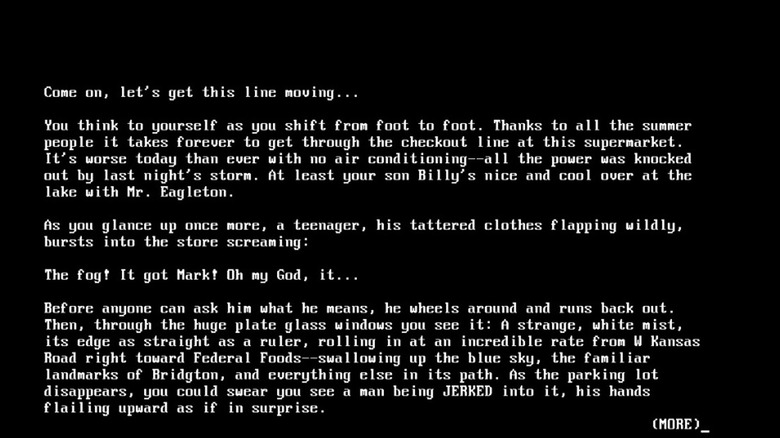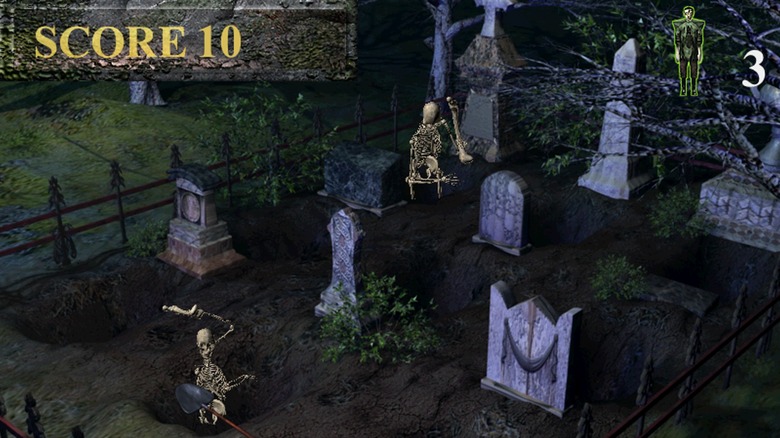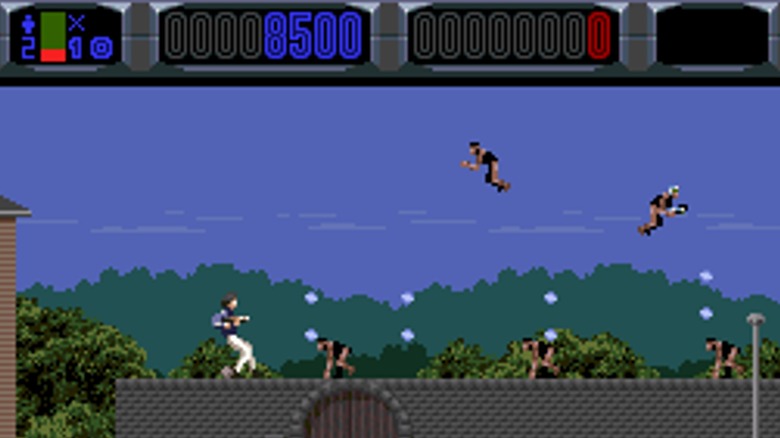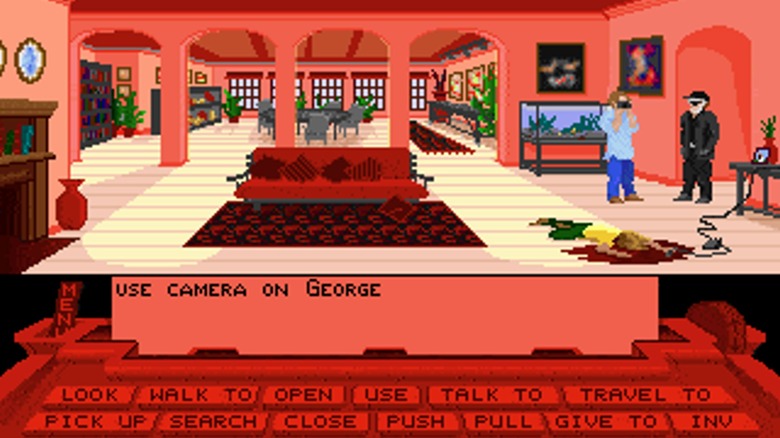All The Major Video Games Based On Stephen King's Books
Almost every literary work written by Stephen King has been adapted in some form. If we are to look solely at the future, several of King's novels are currently in the adaptation pipeline, including Mike Flanagan's take on "Carrie" and "The Dark Tower" novel series. Even King's early short stories, like the lesser-known "Here There Be Tygers," have been recently adapted into an animated short that might've completely flown under your radar. While the cinematic medium has made good use of the author's vast catalog of delightfully strange and moving stories, a certain artistic medium has never quite tapped into them as one would expect. I'm talking about the infinitely rich, evocative world of video games.
Now, as a gamer, I have to say that there's no dearth of games that directly reference King's prolific works or sprinkle Easter eggs about the author himself. Take "Alan Wake" for instance. The titular character is a writer whose fictional world finds a way to literally haunt him, and his surreal journey in the idyllic town of Bright Falls feels directly inspired by the small-town settings of King's novels. Apart from directly mentioning King in the opening monologue, "Alan Wake" pays homage to the axe sequence in "The Shining," and at one point, possessed cars attack Alan, echoing "Christine." Conversely, several indie titles have embedded King's artistic ethos into their narrative DNA, such as the stunningly creepy, deliciously engrossing 1998 point-and-click horror, "Sanitarium."
That said, where are the Stephen King video game adaptations? A post-apocalyptic dark fantasy tale like "The Stand" would make for an astounding open-world premise, its multiple primary characters allowing players to switch control and perspectives as the epic, combat-heavy saga evolves. Although no one has made something like this happen (yet), some loose video game adaptations of King's books exist, even if they have been forgotten or do not do justice to the source material. Let us take a deep dive into this bafflingly limited list of Stephen King games, some of which are still available to play (although you might need an emulator to run them).
Stephen King's The Mist game is a bizarre text adventure
Text-based games have massively evolved since their boom in the late nineties, having branched into subgenres including text-based adventures/interactive fiction that allowed players to type simple commands to proceed. You might have played "The Oregon Trail" at some point, which employs the text-based framework to map a seriously challenging wagon journey from point A to point B. Turning King's "The Mist" — which goes from 0 to 100 real quick — into a text adventure is not a bad idea by any means, which is why Mindscape and Angelsoft collaborated to create one in 1985. Here's an excerpt from the synopsis that graces the game's back cover:
"Another Saturday. Another stop at the market. And another wait in the checkout line. Until a shadow descends and someone shouts: "The fog! You oughta see it!" And you do: a mist advancing toward Federal Foods, engulfing the blue sky, the familiar landmarks of Bridgton, and ... all the people in its path. Your typical Saturday has just ended."
The physical copies of the game originally came with a stunningly detailed map of Bridgton, Maine, serving as a point of reference for players while typing in direction commands (like E for East and W for West) during in-game navigation. I was a bit surprised that the game dives directly into the panic encircling the grocery store, without setting up anything about the storm, the power cuts, or the impetus behind the townsfolk flocking to the local supermarket. We play as David Drayton, the father in the story, and our goal is to survive and rescue our son, who is not with us inside the store. What happens next is determined by a trial-and-terror command chain with which we can explore our surroundings, talk to other characters, and pick up items like a box of salt or, if you're lucky, a gun.
How does this experience hold up? Well, as per text-based game conventions, "The Mist" feels rather dated, but the most frustrating aspect is figuring out commands designed to further the narrative. Moreover, what makes this text adventure an underwhelming one is its inability to be scary or evoke the existential dread that King's novella sustains with the macabre advent of the fog.
Stephen King's F13 can hardly justify its existence
In 1999, Blue Byte Software released "Stephen King's F13," which was marketed as a collection of casual games described as "macabre interactive time-killers drive you to the brink of madness." The game also included a then-unpublished copy of King's fantasy novella "Everything's Eventual," which follows a high schooler with uncanny psychological powers. Bonus features included six screensavers, a King-focused quiz, and 20 sound systems for your computer. The problem? "Stephen King's F13" is a complete waste of anyone's time.
You might have guessed that "F13" is a reference to a nonexistent function key, and the game, for some reason, wants you to be scared of it. "Would you dare strike such a key?" the game asks, painting it as a portal of unknown terrors, doing a poor job of backing such an outlandish premise with convincing worldbuilding. What's more, the mini-games included — "No Swimming," "Bug Splat," and "Whack-A-Zombie" — feel asinine, offering absolutely no entertainment or immersion value past a few seconds of initial curiosity. What does whacking roaches with a fly swatter have to do with Stephen King or any of his fictional worlds that range from grim to fantastical? Yeah, I don't know either.
The digital version of "Everything's Eventual" is the only worthwhile component of this game, but I'm sure it is better to enjoy it as a part of the 2002 anthology (of the same name) that is readily available for perusal. The horror-themed screensavers and "Deathtop" backgrounds included are also pretty silly, and not worth it.
The Lawnmower Man game is corny but entertaining (to an extent)
The next Stephen King game I'll be talking about is based on the 1992 sci-fi flick, "The Lawnmower Man," which is loosely based on King's short story of the same name. In this Brett Leonard-helmed film, Dr. Lawrence Angelo (Pierce Brosnan) decides to experiment on landscaper Jobe (Jeff Fahey) in an attempt to enhance his intellect but ends up giving him superhuman abilities. No, this is not a superhero origin story, as Jobe becomes obsessed with virtual reality simulations, and wants to fuse those aspects with reality to evolve into a digital entity with a beating heart. It is not surprising that a video game was inspired by this premise: in 1993, Coconut Japan and Time Warner Interactive released "The Lawnmower Man," originally intended for the SEGA Genesis console. A SEGA CD version is still available for those interested in experiencing this game.
The game's storyline is directly lifted from the 1992 movie, presented as interactive fiction with shooting and platforming challenges, which can be completed by controlling Dr. Angelo or another character. The only dopamine hit presented is through the minigame levels, although it might be frustrating to figure out the controls or objectives (as the game refuses to explain anything). Just like "The Mist" text adventure, this is a product of its time, designed specifically to underline the features of the console it was originally meant to play on, most of which lose their sheen after being ported into other mediums.
From a narrative perspective, "The Lawnmower Man" relies exclusively on the player's knowledge of the film it is based on. Without a rough idea of who Jobe is (or what his motivations are), you might feel lost as to why you're being chased through an obstacle course exclusively designed to kill you.
The Dark Half is the most substantial Stephen King video game (so far)
George A. Romero's 1993 horror, "The Dark Half," is based on King's 1989 novel of the same name, and takes a more psychologically dense approach to the author's dark, cynical best-seller. A year before Romero's film was released, Capstone Software published "The Dark Half," a point-and-click adventure that has become somewhat of a cult classic over the years.
To set the record straight, I think the game fundamentally misunderstands King's story about an author forced to undergo a public humiliation ritual and confront his innermost demons. The game's treatment of the story is rife with plot holes, and the gameplay is convoluted enough to test your patience with the "Game Over" screen every once in a while. However, it is — due to an absence of meaningful alternatives — the best video game treatment of a King story to date, sought after by King completionists despite its glaring flaws.
We play as Thad (the author), who has been framed for a ghastly murder, which prompts him to help solve the mystery and clear his name. The way the game unravels this journey is a bit nonsensical, as nothing that Thad does feels warranted (such as stealing evidence from a crime scene even before he is implicated in any crimes). The option to interact with other characters feels cumbersome on a technical level, and every objective given to us is half-baked, failing to connect with the evolving story. In essence, not a good game, or a good adaptation.
Apart from these games, there's 1989's "The Running Man," which was released as a Commodore 64 game, but it is such a loose adaptation that it cannot be technically considered a King video game. However, I did stumble upon a more recent King-inspired survival horror titled "The Fog," a 2017 indie title by Horizon Games, available on Steam. Based on "The Mist," the game is a first-person experience with some combat and resource management sprinkled in. The bad news is, it is horrendous: not an ounce of care has gone into crafting an atmosphere for immersion, the graphics are poor, and there is no save button.
It seems that the true video game adaptation curse has to do with the fact that we do not have a decent game based on Stephen King's astounding body of work. Until this curse is lifted, we can only dream.




